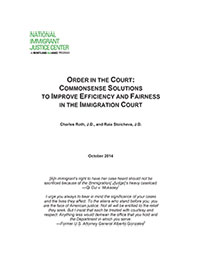 (October 2014) — As the U.S. immigration court system sags under the weight of the Obama administration’s zealous detention and deportation policies, cost-neutral procedural reforms that already are common in other U.S. civil court systems could curb case backlogs, increase access to justice for immigrants, improve immigration judges’ and Board of Immigration Appeals (BIA) decision-making, and reduce burnout on the bench, according to a new white paper released today by Heartland Alliance’s National Immigrant Justice Center.
(October 2014) — As the U.S. immigration court system sags under the weight of the Obama administration’s zealous detention and deportation policies, cost-neutral procedural reforms that already are common in other U.S. civil court systems could curb case backlogs, increase access to justice for immigrants, improve immigration judges’ and Board of Immigration Appeals (BIA) decision-making, and reduce burnout on the bench, according to a new white paper released today by Heartland Alliance’s National Immigrant Justice Center.
The white paper, “Order in the Court: Commonsense Solutions to Improve Efficiency and Fairness in the Immigration Court,” details 21 practical changes the Department of Justice’s Executive Office for Immigration Review (EOIR) could implement at limited cost to taxpayers and without congressional action. The recommendations are based on NIJC’s 30 years of experience representing low-income immigrants before the immigration courts and BIA. Authors Chuck Roth, NIJC litigation director, and Raia Stoicheva, former Lefkow fellow at NIJC, also draw on the Civil Justice Reform Act, which Congress enacted in 1990 to address the high costs, long delays, and insufficient judicial resources that plagued the federal court system.

